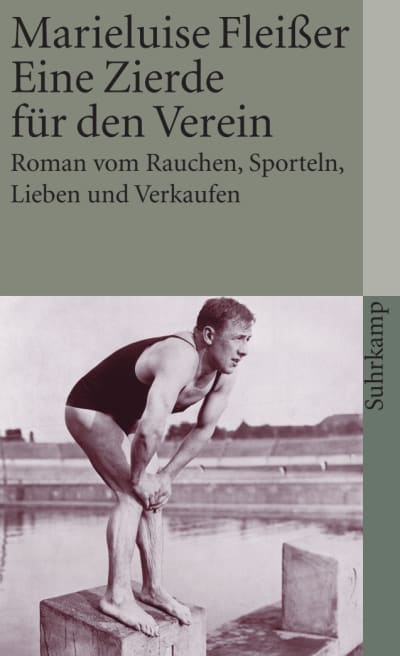Spanish world rights (Caleidoscopio de libros), France (Actes Sud), Denmark (Harpyie)
Written in 1931, banished from the shelves by the Nazis a few years later,...
Written in 1931, banished from the shelves by the Nazis a few years later, and reworked and reissued in 1972, Marieluise Fleißer's only novel is not just a scathing and hilarious portrait of masculinity and a harbinger of the calamity that was about to wash over German society, it also bears a fascinating relation to the author's own life. While Frieda Geier leaves Gustl behind to forge her own path, Fleißer, her career ruined by the Nazis and a falling out with her erstwhile patron, Brecht, returned to her native Ingolstadt, where she worked in her husband's tobacco shop, unable to find time to write. It wasn't until Rainer Maria Fassbinder staged a performance of one of her Ingolstadt plays that she was rediscovered by a broader audience, leading to Suhrkamp reissuing A Credit to the Club.
»I write for those who are determined to understand. I write for those who do not let themselves be fooled.« Marieluise Fleißer
»What interested me in Fleißer’s narrative was this process from the idealisation of romantic love to the focus on the economic relation and a confrontation with the realities of capitalism. Today, too, I see women switching to part-time employment, carrying out unpaid care work, and then falling into poverty in their old age. In the novel, Fleißer also sheds light on the nexus between sport and fascism. In the late 1920s, the local swimming club becomes a focal point for the young men from the town, who are faced with a future without prospects thanks to inflation and unemployment. Their personal hardship makes them receptive to scapegoating, and their hatred is directing against whatever is alien to them. Here, too, I see parallels with the present day.« Alina Fluck, theatre director
»In 1931, when the novel was published, you only would have had to read it properly to understand what was brewing in the small towns of Germany. ... A prime example of modern, narrative prose.« Heidi Pataki, Neues Forum Wien
»Fleisser’s language bears an astonishing amount of weight« Walter Benjamin
»She confronts masculine society in its raw, unadulterated state.« Christa Wolf
»What interested me in Fleißer’s narrative was this process from the idealisation of romantic love to the focus on the economic relation and a confrontation with the realities of capitalism. Today, too, I see women switching to part-time employment, carrying out unpaid care work, and then falling into poverty in their old age. In the novel, Fleißer also sheds light on the nexus between sport and fascism. In the late 1920s, the local swimming club becomes a focal point for the young men from...
Persons
Marieluise Fleißer
OTHER PUBLICATIONS

The Ingolstadt Plays
France (Brigadier), Portuguese rights (Artistas Unidos)
Previously published in the respective language / territory; rights available again: English world rights (Purgatory in Ingolstadt, Methuen), Italy (Graphiservice S.r.l.)
